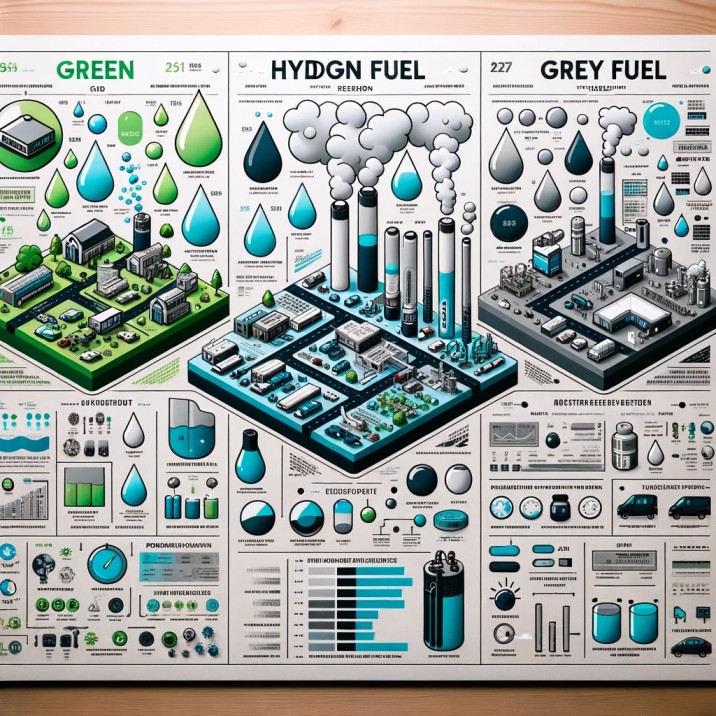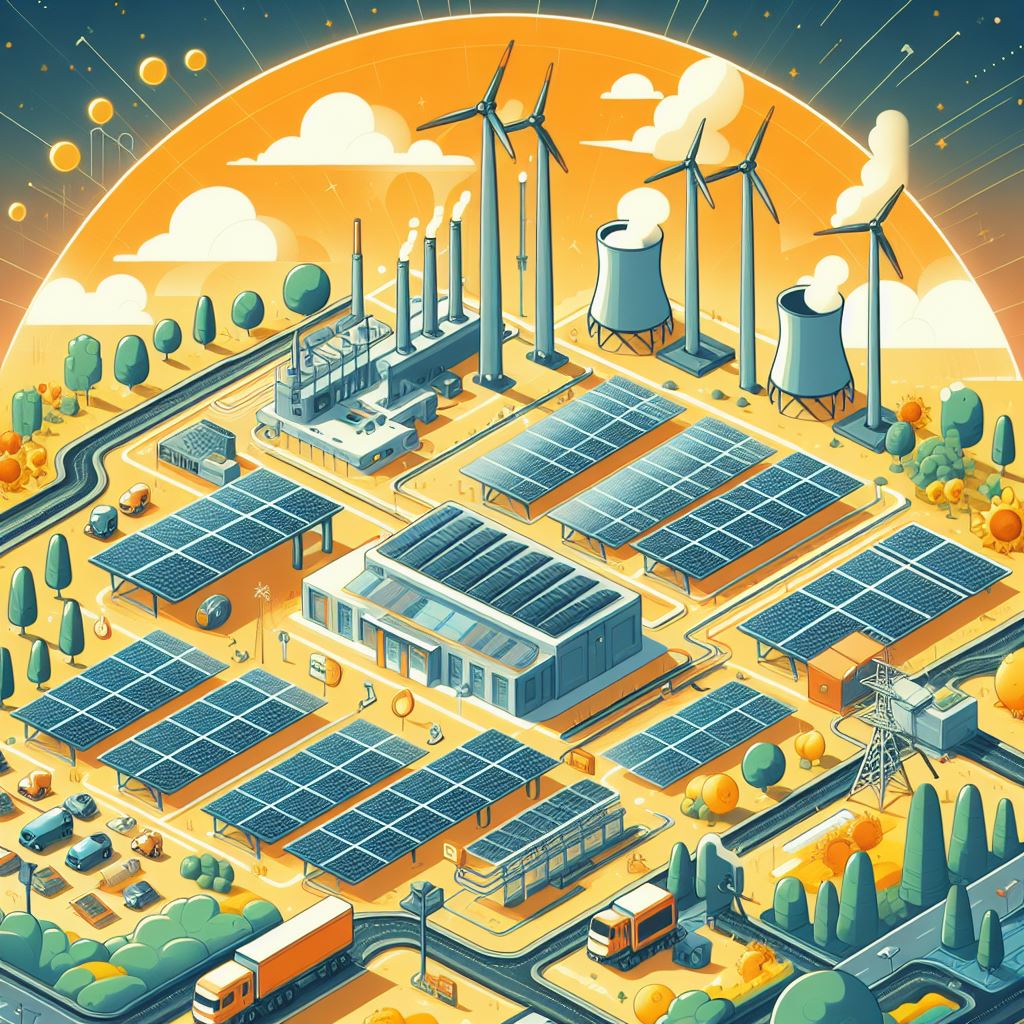Introduction
Hydrogen energy has become a buzzword in today’s world as it holds promising potential for a carbon-free future. However, many people still harbor concerns over its safety, remembering the infamous Hindenburg disaster and thinking of hydrogen as a dangerous substance. But is this myth based on fact?
In reality, hydrogen has been extensively researched, and it has been discovered that it can be safely produced, stored, and dispensed. This clean and sustainable fuel can even be safer than traditional hydrocarbon fuels such as gasoline and natural gas. So, why is the world pushing for hydrogen research and development despite the myths surrounding its safety? Let’s find out.

Understanding Hydrogen Energy
Hydrogen has been used as an energy source for decades and is considered by many as the key to a carbon-free future. Despite its numerous advantages, there are still some concerns about the safety of using hydrogen. This blog busts some of the myths associated with hydrogen safety and explores its potential as a clean, sustainable, and safe alternative fuel source.
Understanding Hydrogen
Hydrogen is the lightest element in the periodic table and the most abundant element in the universe. It is an odorless, colorless, and non-toxic gas that is highly flammable and burns with an almost invisible flame. It is commonly found in water, organic matter, and hydrocarbons.
Properties of Hydrogen
Hydrogen has a number of unique properties that make it an attractive energy source. It has the highest energy content per unit of weight of any known fuel, making it ideal for powering vehicles and other mobile applications. Hydrogen is also an excellent energy carrier, meaning that it can transport energy from one location to another.
Sources of Hydrogen
Hydrogen can be produced from a wide range of sources, including natural gas, coal, and biomass. It can also be produced using renewable sources of energy such as wind, solar, and hydroelectric power. This makes hydrogen a versatile and sustainable alternative to traditional fossil fuels.
Hydrogen Safety
Hydrogen has long been associated with safety concerns, with many people pointing to the Hindenburg disaster as evidence of its dangers. However, the reality is that hydrogen can be safely handled and used as an alternative fuel source. In fact, hydrogen hazards are often more tractable than hazards associated with hydrocarbon fuels.
Comparison of Hydrogen Hazards with Hydrocarbon Fuels
Hydrogen is exceptionally buoyant and is 14.4 times lighter than air. This means that it rapidly disperses upwards and away from its source, reducing the risk of explosions and fires. Additionally, if hydrogen is ignited, it burns quickly with a non-luminous flame that emits only one-tenth the radiant heat of a hydrocarbon fire.
Myths Associated with Hydrogen Safety
One of the most common myths about hydrogen is that it is more dangerous than other fuels. However, this is simply not true. While hydrogen must be handled responsibly, it can be safely produced, stored, and dispensed.
Actual Hydrogen Safety
Numerous tests have been conducted to assess the safety of hydrogen systems, including tank leak tests, hydrogen tank drop tests, and garage leak simulations. The results of these tests reveal that hydrogen can be safely handled and used as an alternative fuel source.
Uses of Hydrogen
Hydrogen has a wide range of potential applications, including transportation, energy storage, and industrial processes. In transportation, hydrogen-powered vehicles have the potential to significantly reduce carbon emissions. In energy storage, hydrogen can be used to store excess renewable energy for later use. In industrial processes, hydrogen can be used as a feedstock or fuel for a variety of applications.
Hydrogen Production
Hydrogen can be produced using a variety of methods, including steam methane reforming, gasification, and electrolysis. Of these, electrolysis is considered the most promising method for producing hydrogen using renewable energy sources like wind and solar power.
The Future of Hydrogen
Hydrogen is a critical component of a sustainable and decarbonized future, with the potential to significantly reduce greenhouse gas emissions. Advances in hydrogen technology are making it increasingly cost-effective and accessible, paving the way for a hydrogen-powered future.
Conclusion
Hydrogen has long been shrouded in myths and concerns about its safety. However, the reality is that hydrogen can be safely produced, stored, and dispensed. Its unique properties and sustainable production methods make it an attractive alternative to traditional fossil fuels, with the potential to significantly reduce greenhouse gas emissions and pave the way for a sustainable future.
Hydrogen Safety
Hydrogen safety is a crucial aspect to consider when discussing the potential uses of hydrogen fuel. It is often assumed that hydrogen is a more dangerous fuel choice than traditional hydrocarbon fuels like gasoline or natural gas. However, this is a myth that is not entirely accurate.
Comparing the hazards associated with hydrogen to the hazards associated with hydrocarbon fuels, hydrogen is not inherently more dangerous. Hydrogen has different hazards, but they are typically more tractable than the hazards of traditional fuels. For example, hydrogen is exceptionally buoyant, and it quickly disperses up and away from its source. Additionally, if hydrogen were ignited, it burns quickly with a nonluminous flame that cannot readily scorch someone at a distance.
Despite these facts, many myths surrounding hydrogen safety continue to be perpetuated. For example, some still believe that hydrogen is explosive and prone to accidentally ignite, leading to deadly explosions. However, this is not true. The reality is that hydrogen must be handled responsibly, or it can behave dangerously under specific conditions. For this reason, it is imperative that appropriate materials are selected to design safe hydrogen systems.
After years of numerous testing of hydrogen systems, the results of these tests reveal that hydrogen can be safely produced, safely stored, and safely dispensed. Today, hydrogen safety is not a myth. In fact, hydrogen is safer than many traditional fuels in some ways.
In conclusion, hydrogen safety is a valid and important concern for anyone interested in exploring the potential of this clean alternative to traditional fuels. However, the facts demonstrate that hydrogen is not inherently more dangerous than other fuel choices. Rather, it simply has different hazards, and proper handling and selection of materials are crucial to ensuring its safe use.
Uses of Hydrogen Energy
Introduction: Hydrogen has the potential to revolutionize the world’s energy systems, but doubts about its safety prevent it from gaining wide acceptance. In this blog, we will debunk myths surrounding hydrogen safety and analyze its uses.
Understanding Hydrogen: What is hydrogen? It’s the most abundant element in the universe and can exist in both gas and liquid form on earth. Hydrogen’s properties make it an excellent alternative fuel source that can be produced from water and almost any energy source. It’s also easily stored and transported.
Hydrogen Safety: Many hydrogen myths persist, but it’s not more dangerous than other fuels. In fact, its hazards are typically more controllable than hazards associated with other hydrocarbon fuels. This makes hydrogen safer for use in transportation and industrial settings, as it poses less of a threat to human life and the environment.
Uses of Hydrogen: Hydrogen’s uses are diverse and range from energy storage and transportation to industrial processes. In transportation, hydrogen fuel cells power electric vehicles that produce zero emissions, serving as a possible clean energy alternative to fossil fuels. In energy storage, hydrogen can be stored for long periods and quickly released to generate electricity. Industrial processes can also use hydrogen as a fuel source, enabling various manufacturing processes to become cleaner and more efficient.
Hydrogen Production: The production of hydrogen has two main methods: steam methane reforming (SMR) and electrolysis. SMR is cost-effective but produces carbon dioxide emissions, while electrolysis uses renewable energy to create hydrogen and oxygen from water. The latter ensures an abundance of green hydrogen that’ll be crucial in meeting future energy needs.
The Future of Hydrogen: Hydrogen is a critical component in the fight against climate change and the transition to a sustainable future. Advanced technologies like fuel cells and green hydrogen production have an immense role in decarbonizing the world’s energy systems. As such, it’s no surprise that countries, industries, and investors are showing a significant interest in hydrogen.
Conclusion: Hydrogen is a safe and versatile energy source with zero emissions potential. It’s crucial for policymakers and investors to recognize the true potential of hydrogen and its place in the future energy mix. With advancements in technology, hydrogen is poised to revolutionize energy systems worldwide.
Hydrogen Production
Hydrogen production is the process of generating hydrogen gas. Hydrogen can be produced from various sources, such as natural gas, coal, oil, and biomass. The most common method of producing hydrogen on an industrial scale is steam methane reforming (SMR), where natural gas reacts with high-temperature steam to produce hydrogen gas and carbon monoxide. Another method is partial oxidation, which involves burning a hydrocarbon fuel with oxygen to produce hydrogen and carbon dioxide.
Renewable methods of producing hydrogen are becoming increasingly popular because they do not emit greenhouse gases like traditional hydrogen production methods. One such method is electrolysis, where water is split into oxygen and hydrogen using electricity. This method can use renewable energy sources like wind and solar power to generate hydrogen. Another renewable method is biomass gasification, where organic materials like wood chips are converted into hydrogen by heating them in an oxygen-depleted environment.
Renewable methods of producing hydrogen have the potential to revolutionize the way we produce and use hydrogen. These methods are not only environmentally friendly but can also be cheaper in the long run. As technology advances, we can expect to see more innovative methods of producing hydrogen emerge.
In summary, with multiple traditional and renewable methods, hydrogen production has come a long way. Researchers have been able to produce it sustainably and more efficiently. With the global drive towards sustainable and clean energy, numerous clean alternatives have emerged. The future looks bright for hydrogen production as we explore new ways to harness the power of this potent gas.
The Future of Hydrogen Energy
Hydrogen is a clean, renewable fuel that could have significant benefits for our planet – but many myths surrounding its safety persist. In this blog, we’ll look at the real story on hydrogen safety, understanding hydrogen, its uses in transportation, industry, and energy storage, how hydrogen is produced, and the advancements in hydrogen technology, making hydrogen a critical component of a sustainable future.
The Future of Hydrogen:
Hydrogen has the potential to play a critical role in a sustainable future. Advancements in hydrogen fuel cell technology have shown that hydrogen-powered vehicles can travel just as far, and provide as much convenience, as traditional gasoline-powered cars. Additionally, hydrogen can play a vital role in renewable energy storage and off-grid power generation. An often-overlooked benefit of hydrogen is that it can reduce the demand on power utilities at peak times, as it can be stored for later use.
Green hydrogen is the most environmentally-friendly application of hydrogen. Renewable hydrogen can be produced via water electrolysis, using electricity generated from solar or wind energy. Hydrogen sourced this way is free from harmful carbon emissions and can be produced and used locally, reducing the need for large-scale infrastructure projects.
Hydrogen storage and transportation are also two areas that have seen significant advancements in recent years. New methods of compressing and liquefying hydrogen have allowed for more efficient transport and storage. Additionally, advancements in fueling stations are making it easier and faster to fill up hydrogen-powered vehicles.
Overall, the future of hydrogen looks bright. As more research is conducted and more applications are discovered, hydrogen could have even more significant benefits for our planet in the years to come.
Hydrogen safety is essential in realizing a sustainable future, and many myths surrounding its use are unfounded. Hydrogen fuels are a safe and viable alternative to traditional fossil fuels, and advancements in technology have made it even safer and more convenient to use. As we continue on a path towards a greener future, it’s essential to recognize the significant role that hydrogen can play in reducing emissions, reducing our dependence on fossil fuels, and increasing energy security.
Conclusion
Hydrogen may have been associated with safety concerns in the past, but with advancements in technology and years of research, it has been proven that hydrogen is a safe and reliable source of energy. Its versatility and environmental benefits make it a critical component of a sustainable future. The future of hydrogen is bright, and we can look forward to further innovations and developments in this exciting field.















